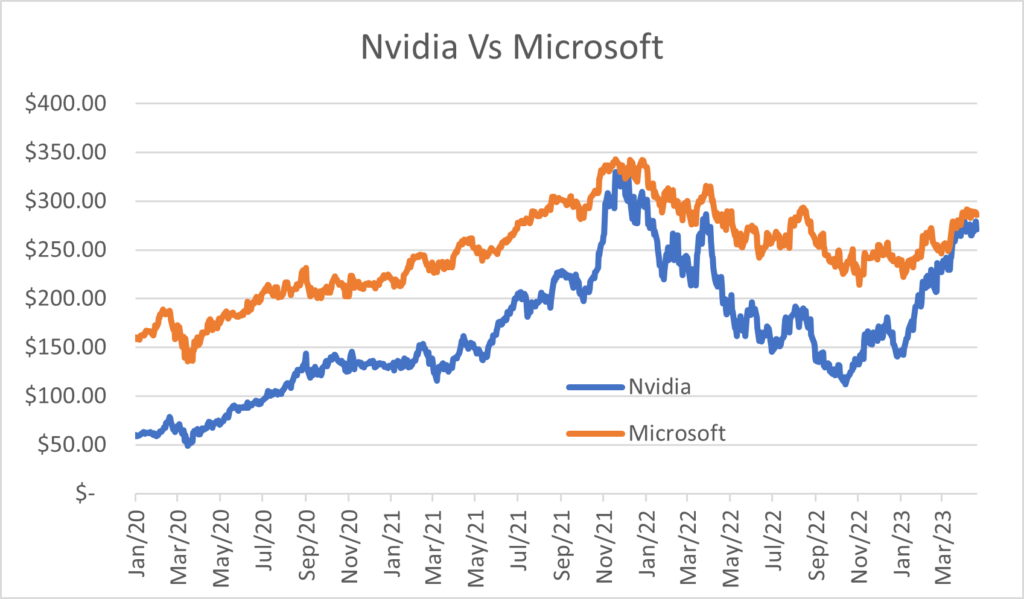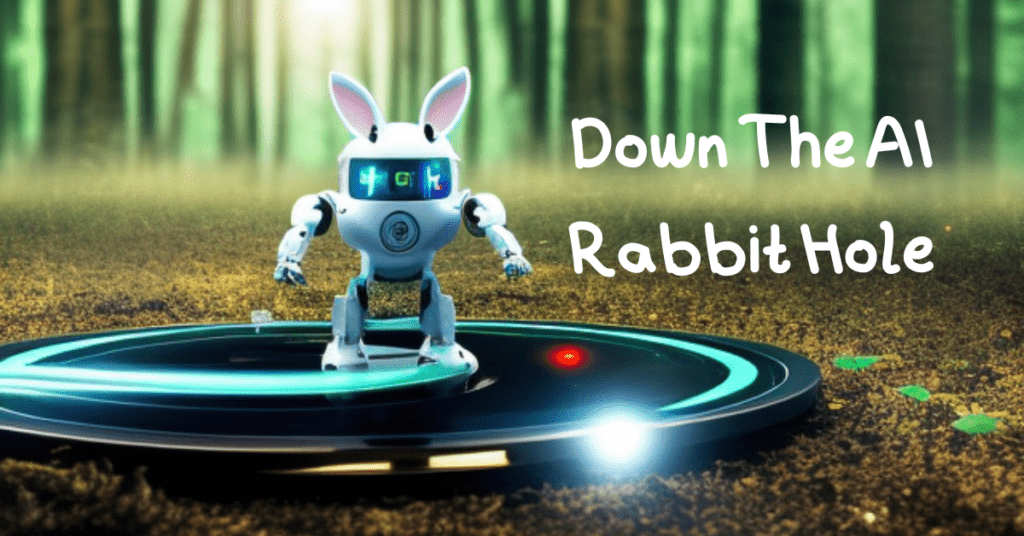It seems like since I came back from two months of exploring Argentina (more on that another time… ) that the general interest in AI has exploded.
With the (relatively) recent release of several new ways to access AI released to all and sundry, the amount of newspaper headlines and internet articles dedicated to this subject has gone a little crazy.
Now, I’ve always been a not-so-secret wannabe tech nerd. So while catching up on the inevitable pile of washing a long trip brings, I decided to take a look at it all myself and see if the hype was worth it.
Three days ( nope, now a few weeks… ) later and I’m clearly hooked. For me, it’s one of those subjects that the more you read and experiment with, the more fascinating it becomes.
It’s also clearly something that’s going to have an ever-increasing impact on the world. That’s something that as an investor I want to know about too.
So what have I learned so far?
AI Meets Real World
Whilst I do have a (tiny) amount of bitcoin exposure in my investment portfolio, it’s based on the value of blockchain. Blockchain is easy to see why it’s valuable, especially having worked in finance and trading back in the day.
But Bitcoin, Ethereum and the veritable army of digital currencies themselves? I’m still struggling to get my head around practical uses for the average person.
But a few minutes of playing with tools like Chat GPT, Bing AI, Bard, Stable Diffusion – and it’s obvious how useful they could be. It’s much harder to think of areas where they wouldn’t or couldn’t get involved.
Now AI obviously isn’t new, It’s already being successfully used and deployed in many different areas and companies. So what’s all the recent fuss about?
To me, it seems like two things have changed in 2023. The pace of new developments and releases of AI-related tech has picked up dramatically. And then there’s that whole thing about how easily accessible to the general public they’ve become.
This second one is where I think it gets really interesting. One of my favourite things about this new tech is how accessible it makes new skills. I no longer need to spend ages learning software programs or coding languages to be able to use them.
For example, I’ve been playing with the text-to-image AI generators this week. Can you tell by this post’s picture?!?
Previously I’d have to rely on finding decent, interesting stock pictures that were free to use. Now, I can create quality (?!) images myself without needing to become an expert graphic designer.
It can be frustrating at times – as in, “dear Mr AI, why does my picture have floating limbs in the background, I find that quite disturbing…” But pretty quickly you can make something half-decent. And there’s a lot of free help available to quickly improve.
That’s just one tiny personal example. You only have to Google/use your favourite search engine and you will see the huge range of tasks that people are completing faster and better with the help of AI.
Take that productivity increase into the world of work and that’s why you have everyone nervously wondering about their job.
But not all areas of work are that suited to benefit from AI. Likewise, some companies will adopt it faster and better than others. That’s going to be a huge competitive advantage for a while. So who do I think will benefit or not?
Winners and Losers of AI
When thinking about the winners and losers of the AI jobs race, at first I figured there were some obvious jobs that wouldn’t be impacted at all. Like hairdressing or bar-tending.
But when I thought harder, I realised I was wrong. It may not be cost-efficient for a long while yet, but both those jobs would be possible with well-trained robots. In fact, this cruise ship already has an AI robot making cocktails!
Taking a step back from robots taking over the salon, and it’s very easy to imagine sitting down with your virtual stylist, uploading your photo and trying out new styles and hair colours. Oh wait, that also already exists. You can tell how long it is since I’ve been to a hairdressers! I really must catch up with the world more often..
How about what others see as irreplaceable careers? After a few searches, some common themes emerged about so-called ‘safe’ jobs. Teachers, lawyers, HR managers for example.
Now a lot of people in corporate roles already consider their HR managers fairly robotic anyways. But it’s not a huge leap to see how AI can be used in any of these areas.
Removing the emotion from difficult decisions ( like, it wasn’t us who fired you, it was AI… ). Analysing previous case history in a blink of an eye, preparing the strongest arguments proven most likely to win. Lessons adapted to every single pupil, based on their learning style and level.
That’s how Deloitte want us to see it anyway, “less other, more brother”. As in AI will be brought in along side, rather than instead of us humans. To start with anyway.
I think that is probably the most likely scenario for a while yet, despite certain sections of the media trying to scare people otherwise. Why? It’s a little like hybrid electric cars – the middle option usually works out best practically.
Instead, I figure it’s going to be more like a new computer language or set of skills. One that if learnt will give those who adapt the fastest a distinct advantage over those who don’t.
There’s also going to be a ton of new opportunities opening up. AI isn’t “magic” (yet). It still needs a lot of human input to make it useful. I’d expect plenty of new career paths to become more mainstream, such as AI trainers, data quality gurus, prompt engineers.
And yes, you read that last one correctly. Prompt engineering is a thing now – and companies are already paying handsomely for people who can write high-quality inputs for AI.
All this makes AI no longer just an interesting side project to satisfy the CEO’s demand that “we do something with AI”. Instead, these roles will become a core part of many companies. New tools will be rolled out to ‘help’ the workers go faster, do more for less. As seen in the Chinese company Alibaba already.
So what’s next?
Where Next For AI?
When you get a few grey hairs like I have now, you get used to a certain pattern in any big news.
First comes the usual over the top predictions – both positive and negative. AI has been no different, with various experts (and not so expert ) rolled out to either excite or terrify their audience respectively.
This is usually followed by the realisation that nothing is actually going to change this week/month and on to the next ‘big’ thing.
Real change usually takes both longer than people think it should, but less than others hope it will. Even in today’s fast-moving world, I think that holds true.
And talking of hope, the Bill Gate’s view on the future of AI was an interesting read, if you haven’t already seen it. I couldn’t help but feel the wistful note of hope rather than expectation when talking about using AI to solve the world’s problems and inequalities.
It’s all too easy to see how, like any other technological advance, it will be a game of two halves. Those able to adapt and embrace the new advantages AI will offer and those left behind at an ever-faster pace.
The more we travel, the more I see these differences first-hand. But not so much between countries, like you might expect. The bigger split it seems to me these days is between city and country. Between wealth and poverty.
For example, many large cities have a very similar feel about them around the world. Fast-paced, same large chains of shops, electric scooters, global food, full of every time-saving convenience available. Of course every city still has pockets where the local culture still exists but it often needs searching out to find.
Whereas travel out to any small town or village and the feel is distinctly different. It’s far easier to see the differences to my own culture.
It’s the same in the UK. I used to work in London, commuting in from Norfolk. Yeah, it was painful. But it was fascinating to constantly see the differences in attitudes. Especially during Brexit. It’s not hard to see why some people see an opportunity, while others see a threat.
All this means to me is I think it’s going to be nigh on impossible to integrate AI into the everyday life of humans in any kind of way that doesn’t further increase these kind of divisions.
I can understand why Musk et al are asking for a time out to consider the implications of the current fast-paced roll-out. Although the sceptic in me says it may also have something to do with slowing down the competition.
Either way, it’s difficult to see regulation keeping up with developments. I mean, you just have to look at the crypto world and how much catch-up there is there. Governments are trying. But as ever how much teeth and ability to actually enforce any new AI regulations will be an entirely different matter.
One thing is undoubtedly true though – some people are going to make an awful lot of money from commercialising AI. As an investor, I think that’s something I want to know more about…
Size of The AI Prize?
As a total aside, one of my favourite ways of looking for new investment ideas is to read old reports from previous years. Essentially backtesting the author’s ability by seeing how their predictions turned out.
It can be quite entertaining at times how far out some of it is. And it certainly gives me some interesting insights. Reinforcing how much and how quickly the market mood can move.
The reporting on AI is a lot like this too. For example, I used ChatGPT to pull together a range of AI future value estimates from a variety of sources. This is what it managed in a couple of minutes and just a few prompts.
Source | Year | AI Value Range | Year of Report | Link to Source |
Gartner | 2025 | $3.9 trillion – $5.8 trillion | 2019 | |
Accenture | 2035 | $14 trillion – $33 trillion | 2018 | |
McKinsey | 2030 | $13 trillion – $30 trillion | 2018 | |
PwC | 2030 | $15.7 trillion – $30.7 trillion | 2017 | |
World Economic Forum | 2025 | $16 trillion | 2020 | |
Deloitte | 2030 | $14 trillion – $16 trillion | 2021 | |
AI Index | 2050 | $30 trillion – $162 trillion | 2021 |
Not bad eh? Obviously the number of different underlying assumptions makes it impossible to compare the different predictions. And this is in no way something I would want to rely on. But it was a very quick starting point of the unsurprisingly large range and where to look for more detail.
Besides, it always entertains me to see the giant ‘fingers in air’ estimates that consultancy firms have to come up with. After all, I should know, I was involved in my fair share back in the day!
I can confidently say that none of these reports will get the answer ‘right’. But it is reasonably likely that AI will likely be one of the fastest growing sectors over the next ten years.
It’s not hard to see how it can add real value to companies. Whether it’s improving productivity in existing tasks or some entirely new use yet unknown. I have little doubt that in due time, AI will be part of our lives much like mobile phones are now.
That makes it something I’d like to start investing in. But how?
Is It Too Late To Invest In AI?
To be honest, I think I’m a bit late to this AI investing bandwagon. Back in the early 2000’s I started investing in green energy and tech ETF’s as my long-term growth sectors. I was ahead of the curve enough that they’ve both done well for me.
But AI? Whilst I might have ‘big tech’ covered in my Tech ETF, there’s a lot of new names (to me) out there that aren’t included. For example, Nvidia comes up a lot as a company, as someone currently winning the race to provide the high-powered GPU’s for data centres.
But you only have to look at it’s share price to see I’m a bit late to the game ( pun intended ) here…

It’s interesting to note how much more volatile a more specialised company like Nvidia is compared to a giant Microsoft, which is obviously far more diversified in sources of earnings.
But I’m not a fan of picking individual growth shares, even for my active future portfolio. It’s pretty hard to know which companies will emerge the big winners from AI.
Pundits can speculate all they like, a targeted ETF is enough for me to spread my money wider. So what are my choices?
Out of the top 4 AI-focused ETF’s to date, BOTZ is the largest by assets under management. So how’s that doing?

Hmm, I’m definately still late to the party, but perhaps not by so much. I’m not alone though, it’s still ~22% increase this year vs the 8% odd of the S&P 500 as new money has piled into this new growth area.
Nvidia is still one of the biggest holdings in this particular ETF but at least I’ll hedge my bets a little wider if I do go this way.
By the way – it goes without saying – all this is my own personal musings on investing in AI – not a recommendation of any sort.
But it does seem (to me) an area worth looking into some more, even if it will doubtlessly be a bumpy ride along the way.
And that’s probably going to be true of AI in general. A change this big will never be painless.
AI - Another Reason For Financial Independence?
It’s been fascinating talking to a variety of friends and family about their views on AI.
Some haven’t heard of it yet – unaware they’re already using it indirectly already.
Most are curious and have had a go at finding out more. But struggle to get beyond the “what do I actually do with it” question.
And then there are those who can see all too well how it can help them in their work. These are the guys and gals most concerned about being left behind if they can’t adapt.
Human history tends to show us that each major technological step promises great things for mankind. More free time for leisure.
The evidence though suggests that in reality that ‘free time’ becomes funnelled into working more, producing more. Just more.
For that reason I think the ability to achieve financial freedom will be ever more valuable. Having options about how and when to work, not afraid of the impact of AI. Instead AI may well even unlock more ways to work flexibly along the path. Hey, I’m ever the optimist still, right.
For me personally, I’m happy I can enjoy being in the ‘playing with AI’ camp. If anything I’m more likely to be tempted back to work as it’s such a fascinating area. But I’m not tempted quite enough yet….!!
Regardless, I think that’s more than enough of this particular rabbit hole for now. Would love to hear your thoughts on the future of AI too below. Optimist or sceptic? Invested or no?





A fascinating post, thanks Michelle.
I haven’t gone down the rabbit hole with AI (yet), but I have been interested and have been using Chat GPT for fun, though not really thought about things too deeply – I think my first question to it was a recipe… I’ve asked it investing questions and can see if I ask certain questions in a certain way, I might be able to get what I am looking for! Could have done with a prompt engineer lol!
At work, I’m aware that our Marketing department already uses Chat GPT quite extensively to write/condense articles – I haven’t thought about using it for my work only because I’ve been too busy to even try it in that context but once I get a quiet afternoon, I’m going to give it a go.
Regarding jobs (which didn’t previously exist), I was chatting to the 22 year old recently graduated daughter of a friend of mine. She told me she had just started work for a mid-sized accountancy firm. I blindly assumed that she was a trainee accountant but no, she was a digital marketeer and was working on the company’s social media and website! Of course, a firm’s digital profile has so much importance these days. I felt so old!
Hey Weenie. Ha, I love it – thanks for that, it made me smile. Especially about the feeling so old part, that I totally understood!
It is crazy/fascinating how much things have changed already in our own life times. Those real life examples of AI being used in the workplace are fantastic – just because of how ‘normal’ it sounds. To me, that’s why you can see how much AI is going to become even more integrated and valuable.
Enjoy playing when you get time – though I warn you, it can be addictive!
Thought provoking in many ways !
One thing that worries a lot me with the current public facing Chat gpt, Bing AI implementations is the danger that whatever it comes back with is perceived to be true, when in fact its only as true as the data its using to generate a result. Much like Wikipedia used to be seen as the font of all knowledge when in fact its open to much abuse and whilst still a great resource it requires users to at least consider how much they blindly trust what it comes back with to be factually correct.
AI is really exciting and in time will likely be transformative but i share your concerns that at least initially most of the benefits will be for the “haves” rather than the “have nots” thus widening further the already growing inequalities in the world.
Will continue to watch and play on the sidelines with interest as this technology becomes more mainstream over the next few years.
Thanks for taking the time to comment, always love hearing what others think.
Absolutely on the truth point. It’s hard enough already to find reliable, unbiased information. You can see good quality sources of data becoming invaluable to train the future AI iterations on.
The thing I find both entertaining and scary at the moment is how willingly the different AI’s will make up information if they can’t find an answer. It’s like the drive to provide an answer is far stronger than any kind of accuracy, whatever setting you have it on. That’s a little odd to me.
And absolutely – I’ll playing a lot more I think – it’s fascinating what you can do already.